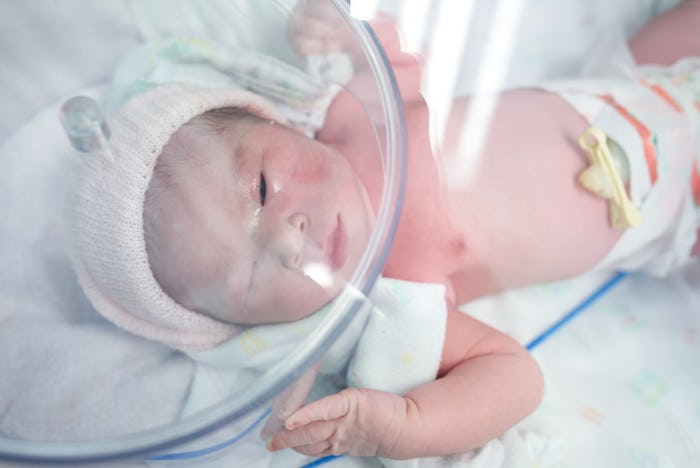Life

Why Do NICU Babies Get Caffeine? The Answer May Surprise You
The caffeine that you rely on to get your day started does so much more than you could ever imagine when it comes to prematurely born babies. But why do NICU babies get caffeine? It's not because it helps them in the same way it helps you (though when they grow up, they may be extra thankful for coffee). WebMD reported that NICU babies get caffeine because the caffeine helps premature babies' lungs.
According to Harvard Medical School, "neonatologists have routinely given premature newborns caffeine as a respiratory stimulant, helping their immature lungs and brains remember to breathe and reducing episodes of intermittent hypoxia (IH)—short, repetitive drops in blood oxygen levels."
In a study published in The New England Journal of Medicine, doctors found that the benefits of using caffeine on premature babies outweighed the risks. "Of all the drugs we use in the neonatal intensive care unit, caffeine is the first to have been shown conclusively to reduce long-term disability in very preterm babies," study leader Barbara Schmidt, MD, a professor at McMaster University in Hamilton, Ontario, Canada, and the University of Pennsylvania in Philadelphia said . Science News reported that data obtained in studies on NICU babies and the use of caffeine "strongly suggests that the effectiveness of chemoreceptor activity is enhanced during caffeine administration." And what exactly is a chemoreceptor? The news outlet dubbed peripheral chemoreceptors as the thing in your body that provides "feed-forward control of respiration, which can thus terminate apnea and initiate normal breathing." Meaning caffeine kicks your chemoreceptors into gear, which then helps initiate normal breathing. No wonder caffeine is so important to NICU babies.
Though you may think that caffeine would be a hard no for babies — considering you're supposed to give it up during pregnancy — carefully giving premature babies caffeine can help stimulate the brain and help them to remember to breathe. According to the Nationwide Children's Hospital blog, almost all of the babies in Nationwide Children’s Hospital’s NICU receive caffeine as they come off of a ventilator and learn to breathe on their own. “The better their lungs works in the short term, the better their brain health will be in the future, preventing lifelong neurologic problems,”Edward Shepherd section chief of Neonatology at Nationwide Children’s said. “Consistently giving these little babies the equivalent of a cup of coffee can have remarkable results.” And making sure these babies have proper use of their lungs is incredibly important. “If babies have lung problems, they are much more likely to have brain problems too. So anything we can do to make the lungs work better and anything we can do to make the lungs function better in the short term is likely to have lifelong impacts on how well these babies can think, how well they can walk, how well they can talk, and so forth,” said Dr. Shepherd, who is also a faculty member at The Ohio State University College of Medicine.
Even though it may seem backwards after you've abstained from coffee and caffeine for the duration of your pregnancy, science supports the fact that caffeine in controlled doses can truly benefit your NICU baby.